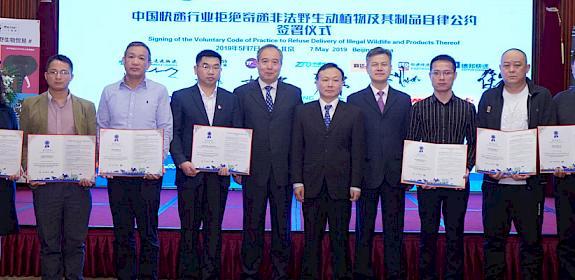China reaches across South Asia frontier in trilateral meeting with Nepal and India
Chengdu, China, 12th October 2011—Urgent priority issues to stop wildlife trafficking through collaboration between China, Nepal and India are on the agenda for delegates of the three countries at a two-day meeting in Chengdu, capital of China’s Sichuan Province.

Debate will focus on how to optimize co-operation to prevent smuggling of wildlife products such as Tiger and other Asian Big Cats, Red Sandalwood, otter skins, Shahtoosh, pangolin and several species of endangered medicinal plants.
The 2nd Workshop on CITES Implementation and Enforcement Among China, India and Nepal addresses common concerns between the three countries, including their commitments to the Global Tiger Recovery Program.
CITES, the Convention on International Trade in Endangered Species of Wild Fauna and Flora, is the principal intergovernmental agreement helping to regulate international trade in wildlife.
TRAFFIC and WWF have provided technical and financial support to the holding of the trilateral meeting, which is hosted by the China CITES Management Authority.
Dr Meng Xianlin, Deputy Director General of China’s Endangered Species Import and Export Management Office, remarked in his opening address on the importance of enhanced communications, wildlife trade management and law enforcement between China and its South Asia neighbours.
“We hope that the three countries can share experience on wildlife trade management, CITES implementation and prevention of illegal activity,” Dr Meng said. “This co-operation is important to promote sustainable development in this sub-region and protect its rich biodiversity.”
In addition to this trilateral dialogue, the meeting builds upon existing bilateral Memoranda of Understanding (MoUs) between China and India, plus China and Nepal. On the latter, the delegations from Nepal and China have agreed several priority actions to implement wildlife trade priorities under the MoU on Co-Operation in Forestry and Biodiversity Co-Operation signed by the two governments in 2010.
“There are approximately 15 transboundary hotspots for wildlife trafficking between Nepal and China’s Tibet Autonomous Region,” explained Diwakar Chapagain, WWF Nepal’s Wildlife Trade Program Coordinator.
“This engagement between Nepal and China is essential to structure a specific mechanism to improve law enforcement co-operation at both central and field levels.”
The influence of regional infrastructure development on wildlife trafficking also needs to be considered seriously. In Nepal, a new trans-national highway will connect India and China with a route from Tibet through Jilong (TAR-China) / Syabrubashi (Nepal), passing adjacent to Nepal’s Langtang National Park, and entering India through Birganj (Nepal) /Raxaul (India). Preparations are therefore urgent to put a robust control system in place between the three countries in advance of an expected expansion of trade in a variety of commodities, including wild animals and plants.
Bringing the three countries together in Chengdu has also allowed China to express its intention to engage productively with the South Asia Wildlife Enforcement Network (SAWEN), the Secretariat of which is hosted by the Government of Nepal.
Effective law enforcement is seen as a fundamental platform for sustainable economic development, the management of natural resources and protection of ecosystems.
“Establishing functional exchange of information will enable more effective law enforcement action between the three countries, and between China and SAWEN,” said James Compton, TRAFFIC’s Senior Director for Asia-Pacific.
“We hope that the countries can agree on priority locations for action to disrupt active trafficking routes. Work on combating trans-national wildlife crime should go hand-in-hand with substantial efforts to raise public awareness and reduce market demand for illegal and unsustainable wildlife products.”
The work of TRAFFIC and WWF in China, India and Nepal on combating Tiger trade has been generously supported by WWF-UK.



